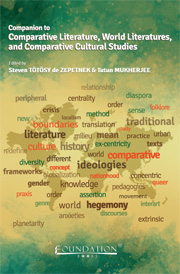Book contents
- Frontmatter
- Contents
- Introduction to the Companion to Comparative Literature, World Literatures, and Comparative Cultural Studies
- PART 1 Theories of Comparative Literature, World Literatures, and Comparative Cultural Studies
- PART 2 Comparative Literature in World Languages
- African Literatures as World Literatures
- Comparative Literature in Arabic
- Comparative Poetics in Chinese
- Comparative Literature in French
- Comparative Literature in German
- Comparative Literature in Iberian Spanish and Portuguese
- Comparative Literature in Indian Languages
- Comparative Literature in Italian
- Comparative Literature in Latin American Studies
- Comparative Literature in Russian and in Central and East Europe
- Comparative Literature in the United States
- PART 3 Examples of New Work in Comparative Literature, World Literatures, and Comparative Cultural Studies
- PART 4 Multilingual Bibliography of Books in Comparative Literature, World Literatures, and Comparative Cultural Studies
- Index
Comparative Literature in the United States
from PART 2 - Comparative Literature in World Languages
Published online by Cambridge University Press: 05 April 2014
- Frontmatter
- Contents
- Introduction to the Companion to Comparative Literature, World Literatures, and Comparative Cultural Studies
- PART 1 Theories of Comparative Literature, World Literatures, and Comparative Cultural Studies
- PART 2 Comparative Literature in World Languages
- African Literatures as World Literatures
- Comparative Literature in Arabic
- Comparative Poetics in Chinese
- Comparative Literature in French
- Comparative Literature in German
- Comparative Literature in Iberian Spanish and Portuguese
- Comparative Literature in Indian Languages
- Comparative Literature in Italian
- Comparative Literature in Latin American Studies
- Comparative Literature in Russian and in Central and East Europe
- Comparative Literature in the United States
- PART 3 Examples of New Work in Comparative Literature, World Literatures, and Comparative Cultural Studies
- PART 4 Multilingual Bibliography of Books in Comparative Literature, World Literatures, and Comparative Cultural Studies
- Index
Summary
Abstract: In his article “Comparative Literature in the United States” Gerald Gillespie outlines the repertory of comparative literary and cultural studies in the United States and points to relevant factors leading up to the effective merger of older literary criticism and sociological approaches. Gillespie argues that the fragmentation of comparative literature into a plethora of subfields is natural and corresponds to the complexity of the U.S.-American situation of scholarship. Further, Gillespie argues that the educational institutions hosting comparative studies have become stymied and have failed, thus far, to boost such studies to the level of current international awareness.
Introduction
Academic life in the USA has long been marked by a considerable participation of immigrants and occasional visiting scholars from a host of nations. This cultural resource was especially important in the discipline of comparative literature following World War II and continued to play a significant role. The enormous size and complexity of the U.S.-American system of higher education has contributed to what are the two primary characteristics of comparative literary and cultural studies in their entry into the new millennium in the USA: a) their extraordinary, probably unavoidable and irremediable fragmentation and b) the tendency to generate new waves on a fairly regular basis, originating from various sectors of the humanities and social sciences (on an earlier outline of comparative literature in the U.S., see Mourão). In hindsight, we can perceive something like a ten-year pattern or rhythm of overlapping generations.
- Type
- Chapter
- Information
- Companion to Comparative Literature, World Literatures, and Comparative Cultural Studies , pp. 353 - 368Publisher: Foundation BooksPrint publication year: 2014



